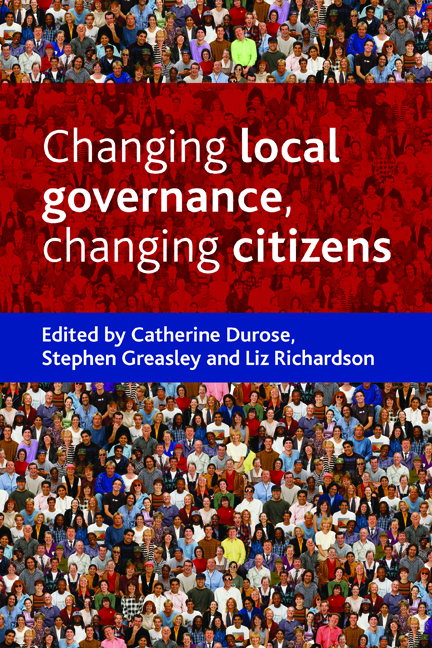Book contents
- Frontmatter
- Dedication
- Contents
- List of boxes and tables
- Acronyms
- Notes on contributors
- Acknowledgments
- Foreword
- Preface
- one Changing local governance, changing citizens: introduction
- two Citizen governance: where it came from, where it’s going
- three ‘Neighbourhood’: a site for policy action, governance … and empowerment?
- four Urban housing market restructuring and the recasting of neighbourhood governance and community
- five Citizen aspirations: women, ethnicity and housing
- six Can we promote cohesion through contact? Intergroup contact and the development of community cohesion
- seven New migrants, citizenship and local governance: ‘Poles’ apart?
- eight Citizens of faith in governance: opportunities, rationales and challenges
- nine Citizens’ reflections on behaviour change policies
- ten Every child’s voice matters?
- eleven e-citizenship: reconstructing the public online
- twelve Conclusion
- Index
six - Can we promote cohesion through contact? Intergroup contact and the development of community cohesion
Published online by Cambridge University Press: 16 July 2022
- Frontmatter
- Dedication
- Contents
- List of boxes and tables
- Acronyms
- Notes on contributors
- Acknowledgments
- Foreword
- Preface
- one Changing local governance, changing citizens: introduction
- two Citizen governance: where it came from, where it’s going
- three ‘Neighbourhood’: a site for policy action, governance … and empowerment?
- four Urban housing market restructuring and the recasting of neighbourhood governance and community
- five Citizen aspirations: women, ethnicity and housing
- six Can we promote cohesion through contact? Intergroup contact and the development of community cohesion
- seven New migrants, citizenship and local governance: ‘Poles’ apart?
- eight Citizens of faith in governance: opportunities, rationales and challenges
- nine Citizens’ reflections on behaviour change policies
- ten Every child’s voice matters?
- eleven e-citizenship: reconstructing the public online
- twelve Conclusion
- Index
Summary
Introduction
Recent years have seen an upsurge of interest in the effects of immigration and increased ethno-cultural diversity. As in countries elsewhere, in the UK policy makers and practitioners face a number of challenges that are multidimensional in nature. In the wider national and international context, new migration patterns, rapid demographic change and the arrival of super-diversity highlight the evolving nature of diversity in contemporary Britain and raise important questions over the extent to which local authorities are able to bring together increasingly diverse and often transient groups around a set of shared values and sense of belonging. Linked closely to these broader trends are more specific challenges such as multilingualism and the proliferation of transnational networks, all of which require national and local government to think in different ways about how best to effectively encourage and support relationships between different ethnic groups. Meanwhile, at the micro-level, a further challenge centres on the changing perceptions and attitudes of citizens toward immigrants, minority ethnic groups and increased diversity more generally. Confronted with the arrival of new migrants and changing neighbourhoods, some citizens perceive ethnic ‘out-groups’ as posing a threat to the socioeconomic resources and cultural values of the native ‘in-group’. A sense of anxiety over the allocation of scarce resources and perceptions of ethnic threat and competition appear to be important drivers of prejudice and antiimmigrant hostility (for example, McLaren and Johnson, 2007). Such views seem to owe less to concern over personal well-being than a sense of anxiety over the ‘threat’ that immigrants and minority ethnic groups (though increasingly Muslims) pose to the collective in-group. A corollary issue centres on the specific challenge posed by organised extremist movements, which seek to mobilise support by embellishing these perceptions of a threatened way of life (see Eatwell and Goodwin, 2010). Researchers, policy makers and practitioners face the task of understanding what produces these psychological states and also what tools might be used to combat them.
Confronted with those challenges above some have argued that the traditional model of multiculturalism in Britain offers an inadequate response in that it has prioritised what differentiates one ethnic group from the next at the expense of promoting commonalities that bind different groups together.
- Type
- Chapter
- Information
- Changing Local Governance, Changing Citizens , pp. 91 - 110Publisher: Bristol University PressPrint publication year: 2009



